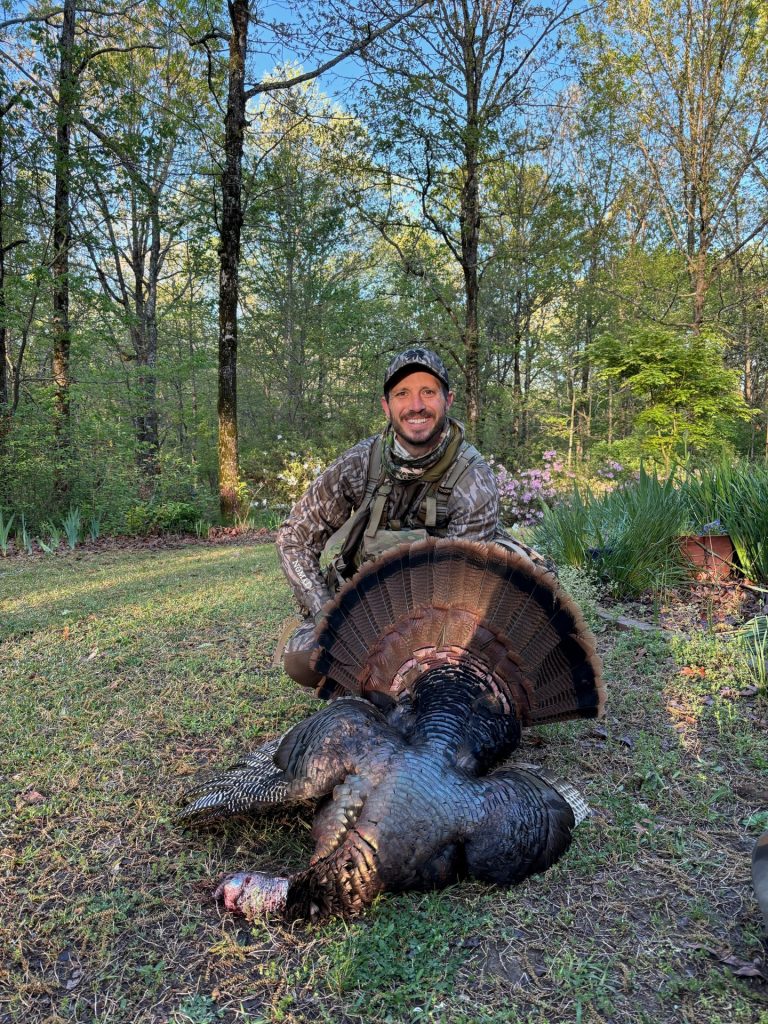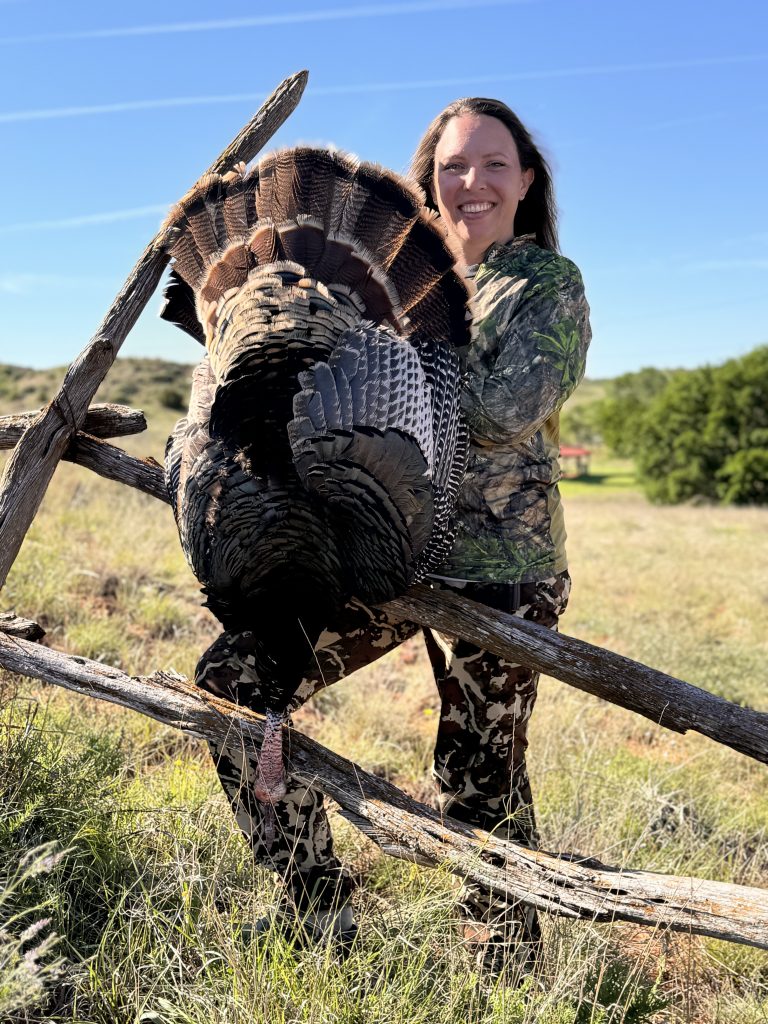NWTF Spotlight Series: Conservation Staff
For this spotlight series, we are highlighting NWTF staff who are vital to our mission of conserving the wild turkey.
Recently, the NWTF conservation team implemented a strategic shift, promoting district biologists to initiative “points of contact” responsible for conservation efforts in their respective NWTF America’s Big Six of Wildlife Conservation regions. This move aims to enhance the effectiveness and efficiency of conservation delivery, building on the milestone achievement of conserving or enhancing over a million acres of habitat in 2023 — the most in NWTF’s 50-year history.
Two of these newly appointed supervising district biologists are Derek Alkire, who will serve as the point of contact for the Habitat for the Hatch initiative, and Annie Farrell, who will serve as the point of contact for the Waterways for Wildlife initiative.
Derek Alkire, district biologist for Alabama, Kentucky and Tennessee

Derek Alkire lives a life deeply connected to the outdoors, where his passion for conservation and love for hunting and fishing have profoundly shaped both his career and personal life. For Alkire, every aspect of his life is connected to the outdoors. From meeting his wife through an NWTF state board member and having a wedding party full of friends from outdoor excursions and conservation work, his connection to nature is profound.
"My relationship with God and my family is at the top of the list, but the outdoors sits solid in the bronze position," Alkire said. “The beauty is that the outdoors can be a place where we can feel closer to God and a place where we can make countless memories with family, so for me the outdoor lifestyle is woven into everything I do.”
As NWTF district biologist for Alabama, Kentucky and Tennessee, Alkire ensures the NWTF’s mission is implemented in these states. Collaborating with volunteers and conservation partners, Alkire helps create quality habitat projects benefiting wild turkeys and other wildlife species. His role also includes managing forester positions in Arkansas and Louisiana and ensuring that funds raised by volunteers are matched with additional resources for a landscape-level impact on wild turkeys. Recently, Alkire was promoted to the point of contact for NWTF’s Habitat for the Hatch initiative, focusing on creating essential nesting and brood-rearing habitats to support turkey populations.
His passion for the outdoors began in rural West Virginia, where his childhood was spent in the woods with his uncles and father. These experiences ignited a lifelong love for the outdoors, which he looks forward to passing down to his son.
“I chose this line of work because I want other families to be able to experience the joys that I had in the outdoors so that they too can make connections and memories that will last them a lifetime,” Alkire said.
Despite his strong connection to the outdoors, Alkire faced challenges at the beginning of his career, particularly in gaining necessary conservation field experience locally. This challenge forced him to move out of his hometown and comfort zone, living in five different states in pursuit of his career.
"You have to be willing to step outside your comfort zone for the things that you are passionate about, and I'm thankful that I did," Alkire said.
Looking back on his career, Alkire advises aspiring conservationists to put yourself out there, volunteer and build relationships within the field.
"Volunteer for conservation organizations or help state agencies with a check station or river cleanup,” he said. “This is a relationship business, and the more relationships you can build by meeting people already in the field, the more successful you will be down the road.”
Looking to the future, Alkire aims to address the declining percentage of hunters and the shifting public mindset regarding conservation
“I aspire to educate the public and policymakers about the value of wildlife conservation and active management,” Alkire said. “I want to be the voice for active management so that wildlife species such as the wild turkey can thrive into the future.”
Annie Farrell, district biologist for Texas, Oklahoma, Kansas and Nebraska

For over seven years, Annie Farrell has served as a district biologist with the NWTF, playing a pivotal role in advancing the NWTF’s conservation mission across Texas, Oklahoma, Kansas and Nebraska.
Farrell’s love for nature took root in her childhood, spending countless hours fishing, camping and hiking — activities that nurtured a deep appreciation for the outdoors and blossomed into a lifelong passion.
“My parents prioritized family vacations in the outdoors, like camping and visiting national parks,” Farrell said. “So, I grew up loving the outdoors.”
This early exposure to nature ignited her passion for wildlife and the natural world. While researching universities, she realized she could turn this passion into a career by studying wildlife. She pursued a Bachelor of Science in forest resources with an emphasis on wildlife and fisheries at the University of Georgia.
It also wasn't until college that Annie discovered hunting. At the University of Georgia, she participated in a mentored dove hunt organized by The Wildlife Society. This experience was her first time shooting a gun, and it marked the beginning of her hunting journey. It was also where she met her husband, who further introduced her to the joys of hunting.
“Since then I have hunted deer, ducks, turkeys, dove and squirrels,” Farrell said. “Though I don’t get out as often as I would like these days, I still love hiking, camping and outdoor recreation, and I love that I get to contribute to conservation on a daily basis for my job.”
Furthering her career, she secured a graduate research project at Mississippi State University, studying wild turkeys. This experience earned her a Master of Science degree and set the stage for her career in wildlife conservation.
As a woman in the wildlife field, Farrell faced challenges that many women in the outdoor space encounter. Often, she found herself as the only female in meetings, which required her to build confidence and assert her place in the industry.
“Over the years, I have learned to be more confident in myself and hold my head high because I know I am meant to be there,” Farrell said.
Motherhood introduced another significant challenge. Navigating her career while raising twins required her to find a balance between professional and personal life.
“Managing my work life balance became a huge priority,” she said. “It can be really easy to work long hours while pursuing a career in conservation, but with children at home, I have had to get good at setting boundaries and prioritizing the greatest conservation needs for my four-state district. It is the best getting to be a mom and a wildlife biologist.”
Looking ahead, Farrell said she hopes to see more women entering the field of wildlife biology. She aspires to create a more inclusive environment for women, mothers and families within the conservation community. Her advice for those interested in a career in conservation is to be receptive and stay committed.
“Wildlife biology can be a logistically challenging and physically demanding career choice, but if you are open minded and willing to move around, you will find success,” Farrell said. “Though it may be difficult, keep at it because it is worth it. Wildlife biologists are an extremely passionate group of people, and it is so rewarding to become a part of that network and see the collective conservation efforts actually make a difference on the landscape.”
